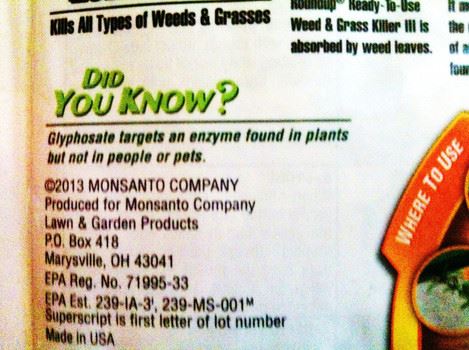Monsanto is being sued for false advertising. A lawsuit filed April 21, 2015 in Los Angeles County accuses Monsanto of false advertising. The biotech bully from Missouri claims in its labeling that glyphosate targets an enzyme found only in plants but not in humans or animals. This claim by Monsanto is meant to support the company’s stance that glyphosate is harmless for humans. This claim is also patently false, according to the petition filed as Case No: BC 578 942.
Related: Monsanto Lawsuit | Attorney
Exhibit 1: Monsanto’s Big Lie
The photo below is Exhibit 1. Monsanto’s language at issue reads: “Glyphosate targets an enzyme found in plants but not in people or pets.” Here’s the actual label:

Monsanto’s False Advertising
The lawsuit filed in California argues that the targeted enzyme, EPSP synthase, is found in the microbiota which reside in human intestines; therefore this enzyme EPSP is found in humans and animals (emphasis ours) . The suit further charges that both human and animal health problems occur with the disruption of these vital intestinal microbes.
The petition reads, in part: “Because it kills-off our gut bacteria, glyphosate is linked to stomach and bowel problems, indigestion, ulcers, colitis, gluten intolerance, sleeplessness, lethargy, depression, Crohn’s Disease, Celiac Disease, allergies, obesity, diabetes, infertility, liver disease, renal failure, autism, Alzheimer’s, endocrine disruption, and the W.H.O. recently announced glyphosate is ‘probably carcinogenic’.”
Gut Fauna tied to Mental Illness, Obesity, Diabetes
Natural Society reports that poor gut health has been directly tied to mental illness, which may explain the influx of people being diagnosed with a mental illness, and poor gut health has also been tied to metabolic syndrome, obesity, diabetes.
EPA filpflops for Monsanto
An Environmental Protection Agency memo dated October 30, 1991 states that the EPA classified glyphosate as a “possible carcinogen” in 1985. Then in a 1991 memo, with no valid reason, EPA changed the classification to “not Carcinogenic.” Three scientists refused to sign. Two of them wrote “Do Not Concur” beside their name. The document contains data showing a statistically significant increase in tumors in laboratory animals treated with glyphosate. But because there weren’t more tumors in the group of animals who received a higher glyphosate dose than those who received a lower dose, Monsanto made the claim that the tumors could not be related to glyphosate.
Glysophate is Carcinogenic
Glyphosate – the main ingredient in Roundup and the central pillar in the entire Monsanto gambit – has recently been classified as carcinogenic by the World Health Organization and The American Cancer Society. Both listed glyphosate as a Group 2A carcinogen. That might be sufficient to have the poison banned in any country except for the U.S. It has already been banned in France and several other countries. Here, sadly, Monsanto’s lucrative political ties and the company’s longstanding revolving door employment arrangement with the FDA and the USDA have helped the company thrive and made it almost as impervious to litigation as its “terminator” seeds are to the company’s carcinogenic Roundup.
China weighs Safety of Glyphosate
The April 2015 lawsuit may be the beginning of a legal tsunami for Monsanto. Earlier in April, according to examiner.com, Beijing resident Yang Xiao-lu filed a lawsuit against the Chinese Ministry of Agriculture requesting disclosure of the toxicology report submitted to the Chinese government for glyphosate pesticide registration in China. The case has been accepted and the collegiate panel of the court has informed the plaintiff that, considering that Monsanto is a stakeholder to the case, they have added Monsanto as an involved party to the case. Chinese citizens had previously petitioned the Ministry of Agriculture for this toxicology report but were denied. The Ministry cited “trade secrets” as the reason for denial.
Monsanto sued for False Advertising
The California lawsuit accuses Monsanto of deliberate falsification to conceal the fact that glyphosate is harmful to humans and animals. Attorney T. Matthew Phillips said, “Defendant intentionally misleads consumers by misrepresenting and concealing the true and correct facts concerning glyphosate…” Phillips further said, “We are not trying to prove that Roundup is harmful or carcinogenic. We are merely pointing out that Monsanto is lying about the enzymes that Roundup targets. Roundup kills the weeds in your backyard and the weeds in your stomach.”
Judgment is sought against Monsanto to prohibit the company from continuing to make the claim that glyphosate targets an enzyme not found in humans. The case also seeks compensation for the plaintiffs, including attorneys’ fees.
Residents of California can become members of the class in this action by contacting T. Matthew Phillips at tmatthewphillips@aol.com. Phillips has indicated that he hopes other attorneys in other states will follow suit [pun intended]. — Thanks examiner.com!
Related
- Monsanto sued in L.A. County for False Advertising
- The California Lawsuit Link: MonsantoClassAction.org
- Monsanto Lawsuit



